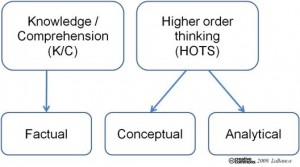April 28th, 2010 by Frank LaBanca, Ed.D.
Note: This article is cross-posted in the CSSA Newsletter. Be a part of the discussion, join my personal learning network, and leave a comment on its contents here.
n March 13, 2010, the Obama Administration released its strategy for revising the Elementary and Secondary Education Act (ESEA), also known as No Child Left Behind. The blueprint, in part, focuses on the development of effective teachers and leaders. The plan requires states to define an effective teacher, effective principal, highly effective teacher, and highly effective principal. Definitions are to be developed in collaboration with teachers and leaders, based in significant part on student growth and other measures such as classroom observations of practice.
he ESEA contains expectations that district level evaluation systems
- meaningfully differentiate teachers and principals by effectiveness across at least three performance levels
- are consistent with their state’s definition of effective teacher and highly effective teacher and principal
- provide meaningful feedback to teachers and principals to improve their practice and inform professional development
- are developed in collaboration with teachers, principals, and other education stakeholders
ow do we, as science education leaders operationalize these broad statements and translate them into meaningful methods to assist in teacher growth and improvement? I think at times, it is necessary to step back and examine how we can compartmentalize the instructional process for the purpose of identifying an area to focus efforts to help teachers improve. Certainly instruction is a very holistic process, but targeting specific teaching skills in the instructional toolbag can give teachers meaningful feedback to improve their craft. My focus here is on effective oral questioning.
uestioning in the classroom is vital to help students develop problem solving and critical thinking skills. To frame this discussion, it is important to consider the different types of questions that a science teacher might ask students (or students might ask teachers). I would classify them into three major categories:
Factual questions are just that: checking facts. Factual questions are composed of isolated information that stands alone and is generally much lower on Bloom’s Taxonomy (knowledge/comprehension). Conceptual and analytical questions, though, would fall under higher order thinking skills questions. Conceptual questions are ill-defined, allowing students to connect ideas together and draw on knowledge to formulate an answer, while analytical are well-defined, challenging students to interpret information or data, and make calculations. Both are more inquiry-based but a conceptual question can have multiple possibilities (i.e., the BEST answer), where a well-defined analytical question has one right answer (i.e., the CORRECT answer). Of course, all types of questions are necessary, especially to scaffold student learning, but are a variety used effectively and judiciously?

s I observe teaching and learning, I often find myself asking many of the following questions: Who (teacher/students) are asking the questions? Are a variety of students participating? Does the teacher answer student questions or does the teacher turn them back to the class for a response? Is appropriate wait time utilized? If a HOTS question is too difficult to answer, does the teacher rephrase or scaffold to provide a structure for student success? What types, in what frequency, and in what proportion are questions being asked by students and teachers?
| Teacher |
| # HOTS questions |
# K/C questions |
| Student |
| # HOTS questions |
# K/C questions
|
If inquiry is learning by questioning and investigation, then effective oral questioning in a science class is critical to the development of student inquiry skills. Helping teachers develop their classroom questioning skills is a necessary and important part of professional mentoring for growth and development.